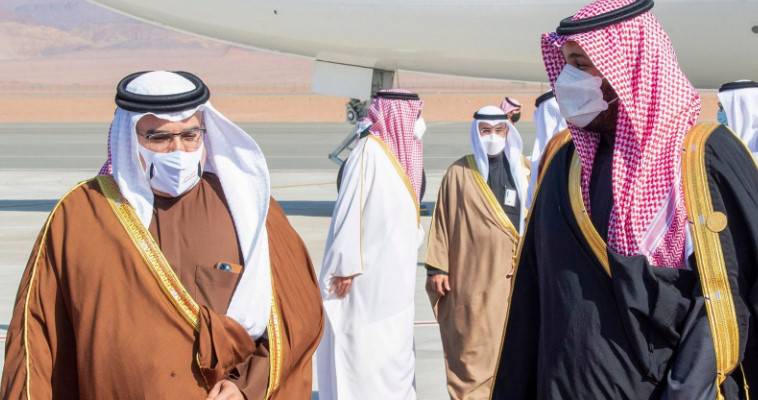Zacharias Michas: Qatar and the geopolitical equation in the Mediterranean-Gulf arc
09/01/2021
The agreement on the process of normalization of relations between Qatar and the other Sunni monarchies in the Gulf was welcomed by the international community. The rupture in the area caused great concern about the diffusion of instability. At the beginning of the conflict, if one believes the authoritative reports of the time, even the possibility of military intervention was open.
The situation at the time rightly raised fears that it would pour water onto Iran’s mill. As expected, the news coming out of the recent Gulf Cooperation Council was treated in Greece in the light of Qatar’s special relationship with Turkey. More broadly, without this dimension, developments would be more regional in nature, despite the energy dimension clearly having a global impact, as Qatar is the world’s leading supplier of LNG gas.
Doha’s funding of the Muslim Brotherhood and its political support from Erdogan was a combination of concern in the wider region. While presented by some circles in the West as a “modernizing trend” within the Muslim world, the truth is that it obscures beliefs that threaten the “Western way of life”.
The cover-up is aimed at making it possible for Muslim countries to seize power and then implement the Islamic agenda in an organized manner. Unfortunately, the beliefs of conservative Islamic circles about the “infidels” (kafir) are not denied in any case. Diplomacy is simply proposed to achieve the main goal, which is none other than the overthrow of the Arab monarchies that are not in line with the Brotherhood.
Erdogan races ahead
Erdogan’s policy is moving in the same direction. Turkey may belong to NATO, it may evaluate the effectiveness of relations with Russia and China, but the real geopolitical weight of Turkey and a factor of its power is its Islamic identity, combined with its Ottoman past in the Arabian Peninsula and in the north. Africa.
In contrast, Erdogan’s bigotry is fueled by insecurity about Turkey’s future, stability, and territorial integrity. The internal stalemate usually leads to anti-diametric policies, with a typical example being the Kurdish community. Erdogan’s policy initially sought a political solution aimed at assimilating the Kurds and when he failed he turned to a policy of severe repression.
Erdogan, instead of being introspective and absorbed in the internal political balances, is trying to race ahead. Through clear participation of Turkey in the global balances, it seeks to sidestep internal problems. Their relegation becomes easier when Turkey’s invasive role in the wider region is proposed.
Turkey’s insecurity about its future is fueled by the belief that in the post-Cold War period, changes and new geopolitical arrangements are inevitable. This is the reason for the unleashing of Turkish expansion. It is normal for us to be concerned with its dimension concerning Hellenism, but the picture is broader.
Erdogan is turning a blind eye to the West, but …
Erdogan’s foreign policy threatens many. That is why the phenomenon of anti-conspiracies is observed, which maximizes the importance of Greece as an ally in stopping Turkish plans. A typical example is the spectacular improvement of relations with Egypt and the Sunni monarchies of the Gulf, which recognize Greece as the first zone of defense, thus directly related to their security. The more resistance he encounters in his neighborhood, the more difficult it will be for Erdogan to realize his grandiose visions.
Turkey is trying to extract as much as it can on all fronts. At the same time, it tries to promote its rediscovery, for those who have “forgotten” it, or simply the maximization of the given geostrategic value of its geopolitical position. The adventure in Nagorno-Karabakh and the subsequent indirect reference to the Azeri minority in Iran fall into this context.
On the one hand, it is “turning a blind eye” to the West in order to create the expectation that it will fight on its behalf so that through Turkey it can ensure the expansion of control or at least the strongest Western influence on the Caspian coast. The reference to Iran connects two different regions. That of Transcaucasia with that of the Middle East.
The destabilization of Iran, in theory, can be “sold” both to Saudi Arabia, a key competitor for influence in the Middle East, and to Israel, which considers Tehran an existential threat. However, in theory, a possible absence of the Iranian dimension could invalidate the logic that led to the rapprochement of the Arab regimes with Israel. In addition, for the Saudis, it would mean replacing the Shiite threat with the more unpredictable Turkish one.
Observing Turkish activity on the map, an informal circle of “basic interest” is formed, defined by Transcaucasia, the Middle East, Africa, and the Balkans, returning to the borders of Russian territory, Ukraine, and Crimea. Beyond this cycle, Turkish ambitions to exert influence on planetary power relations begin …
The American role
Returning to the issue of Qatar, let us recall that the rapprochement effort was initiated by the United States. Their military presence in the Emirate is strong and of great importance. It averts any threat to Qatar’s security and balances the Turkish presence. As much as its presence is desirable to secure against neighboring Sunni monarchies, it is also a threat to overthrow the regime if it decides to deviate from the current chariot anchor in Ankara.
The United States has had a strong presence in other countries in the region, protecting them from Iran. The approach was therefore fated. It was only a matter of time before it happened. The result will be de-escalation, but without drastic treatment of the causes that led to the conflict. Qatar will not stop supporting the Muslim Brotherhood and will not expel Turkish troops from its territory. It will not stop talking to Iran. A marginal normalization of relations with Israel may be achieved. Moreover, it has the same role as that of Azerbaijan as an “agent” of Turkey’s attempt to normalize its relations with those with which it has disrupted.
But the opposite is also true. It can also be a useful tool in the hands of US diplomacy to put pressure on the Erdogan regime. Let us not forget, for example, that the Qatari state energy company is a partner with American ExxonMobil in the development of hydrocarbon deposits in the Cypriot EEZ.
Sensitive balances
We are heading for a situation where the given rivalries will be mitigated, moving within a controlled framework that will prevent them from disturbing the delicate balances of the Middle East. All this can go on because the Erdogan regime realizes that the policy of direct conflict everywhere has reached its limit.
The economic pressure exerted on Turkey has led to a blatant incompatibility between the goals and the economic instruments. It is called to manage the crisis concerning the S-400. It was this move that put Turkey’s independent contacts with Russia outside the US-acceptable framework. It was done in a way that makes it particularly difficult for Erdogan to retreat and balance between Washington and Moscow. This situation has led to numerous side effects that have not been limited to the financial level.
Turkey is in danger of suffering serious geopolitical losses, due to the counter-alliances it has caused. Although the USA’s desire for Turkey to return to its former “normality” is a given, the result is anything but predestined.
But it would be a mistake to underestimate Erdogan’s ability to manage even the most difficult situation, even if he relies on the Western chimera of an irreplaceable Turkey. What emerges with certainty is that the Erdogan regime has proven its potential to cause unrest and reshuffle at the regional level, but it is spreading more widely. The situation is far from clear. Ankara’s policy, however, has gone beyond what is called “calculated risk” …





